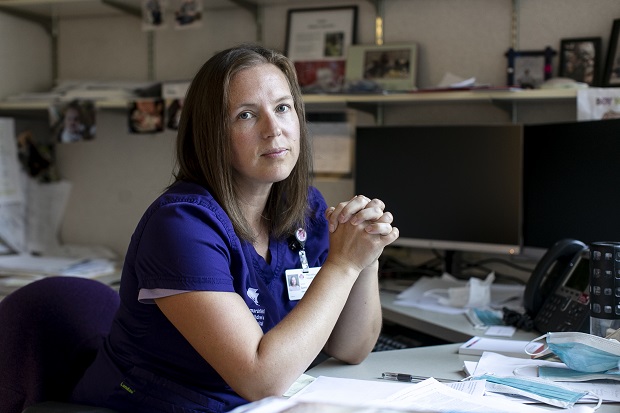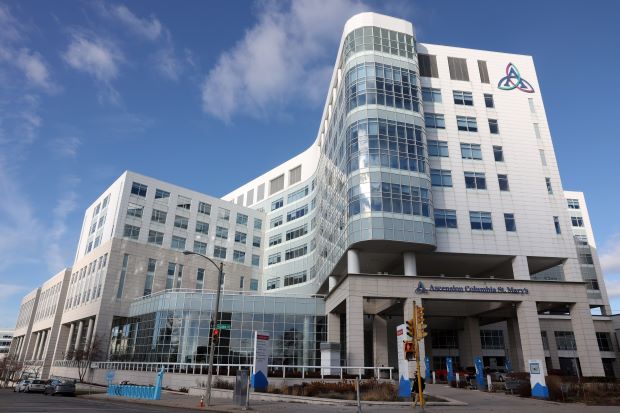173-year-old law allows only ‘therapeutic abortions.’ No one knows what that means, and health systems are scrambling to stay out of criminal trouble
By: Bridgetower Media Newswires//August 22, 2022//
173-year-old law allows only ‘therapeutic abortions.’ No one knows what that means, and health systems are scrambling to stay out of criminal trouble
By: Bridgetower Media Newswires//August 22, 2022//

By PHOEBE PETROVIC
Wisconsin Watch
The patient sat in Dr. Shefaali Sharma’s exam room, distraught. She was pregnant with her third child. Just weeks earlier, the U.S. Supreme Court had revoked the federally protected, constitutional right to an abortion, restoring Wisconsin’s near-total abortion ban from the 1800s.
After a few moments, she summoned her courage, mentioning the recent court decision.
“If it comes down to me or the baby, I need you to pick me,” she told Sharma. “I have two babies at home that I have to take care of.”
Sharma, a Madison-based obstetrician and gynecologist, assured her patient that doctors would take care of her. (Sharma does not typically perform abortions, but other physicians in her practice do.)
Recalling the encounter a few weeks later, Sharma says, “She should be enjoying these moments and not worrying whether or not she will die because of politicians making life decisions for her.”
The Supreme Court decision that overturned federal abortion rights remains unpopular. A majority of Americans and Wisconsinites oppose outlawing abortion. Public approval of the high court has plummeted since the decision was issued. And four of the five-justice majority in the Dobbs decision were appointed by candidates elevated to the presidency without winning the popular vote.
Throughout Wisconsin, physicians are attempting to reassure their patients that they will receive treatment if their water breaks too early or they suffer a miscarriage — all while working with lawyers to determine the circumstances in which they can provide abortions without risking a felony.
“There is no clarity currently, and no consensus,” says Dr. Wendy Molaska, president of the Wisconsin Medical Society.
In the absence of guidance from the state, professional associations, health systems and hospitals — even physicians themselves — are developing policies to guide pregnancy-related care.
The Medical Society has been working with the Wisconsin section of The American College of Obstetricians and Gynecologists, other health care entities and outside counsel to develop legal guidance on the state’s abortion laws. Molaska expects its release to physician members soon.
But whatever advice they provide will not be binding — nor universally applicable.
“Ultimately, the physician(s) actually signing off on or performing the procedure will be responsible for defending its necessity,” says Richie Davis, an attorney with Quarles and Brady, in an email to Wisconsin Watch. Since the decision, the firm has advised Wisconsin health systems and physicians on how to provide care without violating the law.
Any guidelines developed by a health system, hospital or professional association will likely provide broad principles in lieu of specific conditions.
‘Ambiguous’ wording leads to uncertainty
Wisconsin’s ban makes providing an abortion in almost all cases a Class H felony, punishable by up to six years in prison and a $10,000 fine. Physicians convicted of a felony might also lose their medical licenses, rendering them unable to practice. The statute of limitations for most felonies is six years.
“The Wisconsin law is rather ambiguous, and a reasonable clinical disagreement on medical necessity can expose a physician to potential criminal liability,” Davis says. “Even if a physician can win at trial and avoid criminal liability, that same physician may be arrested, detained with a high bail, suffer public shame, and effectively have their practice destroyed for performing an abortion which they believed was medically necessary to save the life of the mother.”
The law contains one exception, a “therapeutic abortion” — which physicians say is an archaic term. The law says the procedure must be deemed necessary “or is advised by 2 other physicians as necessary, to save the life of the mother.”
The statute defines abortion as the intentional killing of an “unborn child” — defined as an embryo or fetus “from the time of conception until it is born alive.”
“Unlike other states which center on the presence of a ‘fetal heartbeat’ to determine whether a fetus is protected under an abortion law, (Wisconsin’s abortion law) casts a wider net,” writes Davis.
But he says the law turns on intent. Any prosecutor who brings criminal charges against a physician must prove that the doctor knew the medical procedure would terminate the pregnancy, had no reasonable basis to believe the procedure was necessary to save the mother’s life and did it anyway.
Molaska notes that the law predates even foundational tenets of modern medicine such as germ theory. Unlike Texas, Wisconsin does not spell out exceptions for ectopic pregnancies or removal of a fetus that has already died. And unlike Alabama, Wisconsin does not allow intervention to “prevent a serious health risk” — only to save a pregnant person’s life.
“Where’s the line that I let her get sick enough so that her life is in danger?” Molaska asks. Or, she wonders, would a physician be barred from removing a deceased fetus if the body does not pass it?
The likelihood a physician will face arrest and prosecution depends on local law enforcement. Attorney General Josh Kaul, who is up for reelection this year, has made it clear he would not prosecute abortion cases.
‘Uncertainty’ in Wisconsin over care
Approaches to care will vary until lawmakers or judges resolve the question of when an abortion becomes life-saving and therefore legally permissible.
Wisconsin Watch attempted to contact 48 hospitals or health systems across the state through email and phone calls. Many did not respond. A few provided brief statements in lieu of answers to questions.
The Richland Hospital and Clinics, for example, wrote that “our services like pregnancy care and miscarriage management are not impacted.” It urged any concerned patients to contact their health provider.
Meanwhile, the Froedtert and Medical College of Wisconsin health network said in an email that it is “still analyzing the recent Supreme Court decision, which creates some uncertainty in Wisconsin.”
Tomah Health said it provides care per the Emergency Medical Treatment and Labor Act (EMTALA). The 36-year-old federal law applies to all hospitals with emergency services that receive Medicare funding, requiring staff to provide stabilizing treatment to patients in emergency situations.
The U.S. Department of Health and Human Services released guidance reinforcing that the law preempts any state-level abortion ban, requiring physicians to provide an abortion if a patient is “experiencing an emergency medical condition … and that abortion is the stabilizing treatment necessary to resolve that condition.”
In early August, the U.S. Department of Justice sued Idaho over its near-total abortion ban. Like Wisconsin’s, Idaho’s law permits abortions to save patient’s life — but not to help the patient avoid severe health consequences, such as permanent disability. The lawsuit alleges Idaho’s law violates EMTALA.

Consensus on ‘life threatening’ ectopic pregnancies
The OB-GYNs interviewed by Wisconsin Watch outlined a few clear cases in which they would provide abortions.
After an initial period of uncertainty, Dr. Kristin Lyerly of Green Bay and Dr. Sarah Goetz of Marshfield determined they would treat ectopic pregnancies the same as always, noting, “Ectopic pregnancies are life threatening. They’re the number one reason that women die in early pregnancy.”
The American College of Obstetricians and Gynecologists distinguishes this treatment from other forms of abortion care. “A tubal ectopic can never be a viable pregnancy, so it is generally viewed outside of abortion,” says Kate Connors, a spokesperson, by email.
UW Health’s Barroilhet says her legal team has broadly distinguished between pregnancies that can and cannot result in a live birth. When it comes to ectopic pregnancies or miscarriages in which the fetus has died, patients will get standard care — medication or surgical procedures — without the patient experiencing much, if any, change.
Other situations remain murky
But if a person’s water breaks before the fetus is viable, or the patient is hemorrhaging but the fetus still has some detectable cardiac activity, the approach is less clear.
Mere days after Dobbs, Goetz received a call from a doctor at a satellite center. The patient had her water break at 17 weeks; normal gestation is 40 weeks, and viability is considered to begin at 24. The doctor was “a little at a loss” of what he could offer her, Goetz says.
She recalls telling her colleague that she believed the law prevented her from offering to induce labor. Later, the patient went into labor naturally, delivering the pre-viable fetus on her own.
If a patient starts to miscarry, but she and her colleagues can still detect embryonic or fetal cardiac activity, they plan to legally protect themselves by having three physicians document how an abortion is necessary to save the person’s life.
The nonprofit Wisconsin Watch (www.WisconsinWatch.org) collaborates with WPR, PBS Wisconsin, other news media and the University of Wisconsin-Madison School of Journalism and Mass Communication. All works created, published, posted or disseminated by Wisconsin Watch do not necessarily reflect the views or opinions of UW-Madison or any of its affiliates.
Legal News
- Former Wisconsin college chancellor fired over porn career is fighting to keep his faculty post
- Pecker says he pledged to be Trump campaign’s ‘eyes and ears’ during 2016 race
- A conservative quest to limit diversity programs gains momentum in states
- Wisconsin prison inmate pleads not guilty to killing cellmate
- Waukesha man sentenced to 30 years for Sex Trafficking
- 12-year-old shot in Milwaukee Wednesday with ‘serious injuries’
- Milwaukee man convicted of laundering proceeds of business email compromise fraud schemes
- Giuliani, Meadows among 18 indicted in Arizona fake electors case
- Some State Bar diversity participants walk away from program
- Wisconsin court issues arrest warrant ‘in error’ for Minocqua Brewing owner
- Iranian nationals charged cyber campaign targeting U.S. Companies
- Facing mostly white juries, are Milwaukee County defendants of color truly judged by their peers?
WLJ People
- Power 30 Personal Injury Attorneys – Russell Nicolet
- Power 30 Personal Injury Attorneys – Benjamin Nicolet
- Power 30 Personal Injury Attorneys – Dustin T. Woehl
- Power 30 Personal Injury Attorneys – Katherine Metzger
- Power 30 Personal Injury Attorneys – Joseph Ryan
- Power 30 Personal Injury Attorneys – James M. Ryan
- Power 30 Personal Injury Attorneys – Dana Wachs
- Power 30 Personal Injury Attorneys – Mark L. Thomsen
- Power 30 Personal Injury Attorneys – Matthew Lein
- Power 30 Personal Injury Attorneys – Jeffrey A. Pitman
- Power 30 Personal Injury Attorneys – William Pemberton
- Power 30 Personal Injury Attorneys – Howard S. Sicula











